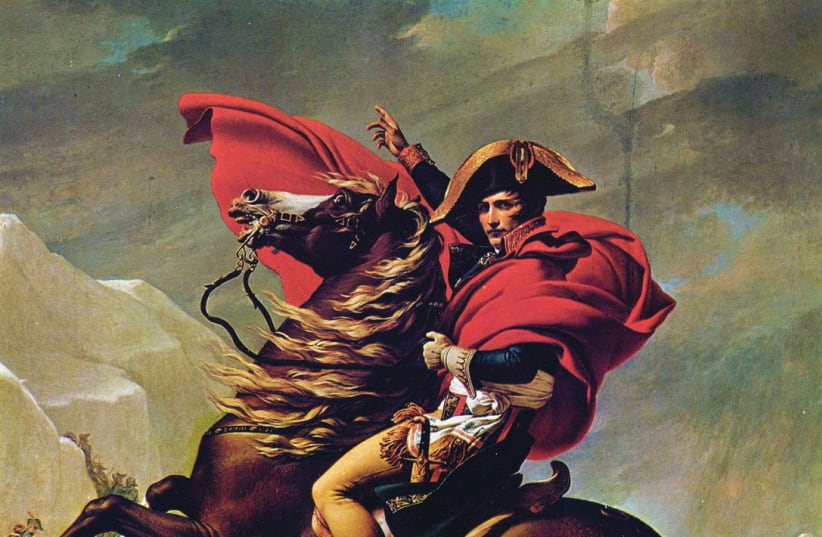Jews who lived under non-Jewish governments throughout history understood that a stable regime, no matter how undemocratic or even despotic, was usually in their best interest. Despite witnessing the Romans’ destruction of the Second Temple and living under their cruel occupation, Rabbi Hanina Segan Hakohanim, taught: “Pray for the stability of the government; for were it not for the fear of its authority, people would swallow each other alive” (Mishna Avot 3:2). But in war zones, Jews often found themselves between a rock and a hard place.
At the end of the 18th century, the lives of Jews in most Italian cities were subject to various restrictions but were tolerable. When the brash 27-year-old French general Napoleon Bonaparte led his troops into Italy in 1796, Italian Jews were aware that the French Revolution had granted French Jews unprecedented rights. It was difficult for Jews to know whom to support.
The action in Michelle Cameron’s Beyond the Ghetto Gates takes place just before, during, and right after Napoleon’s successful conquest of Ancona, Italy. Right after capturing Ancona, Napoleon tore down the gates of the ghetto and granted the Jews rights they had not had beforehand. A Jewish character in the novel, recognizing the significance of the events, says, “It’s the being of a new era for us Jews.” He may, whether he realized it or not, have been referring both to the new opportunities created by this more friendly regime and to the new modern Jewish dilemmas.
An engaging work of historical fiction, it is Cameron’s third book, her second work of Jewish historical fiction. Cameron lived in Israel in the 1980s, served in the IDF, and wrote occasionally for The Jerusalem Post.
Cameron does a fine job of bringing a little-known period of world history – and of Jewish history – to life. She has researched the era carefully and I enjoyed reading about Napoleon’s conquests, the quandaries the Jews faced when deciding how to react, and even the details of an Italian Jewish business that produced the now-famous illuminated ketubot (Jewish marriage documents) of the time.
Some points might raise eyebrows. The claim that in 1796 a Jewish business in Italy was filling orders for ketubot from Jewish customers in the United States stretches credulity, as do some of the characters and aspirations of the characters in the novel. The heroine, Mirelle, knows that at 17 it is time for her to get married, but feels “doubly trapped – as a Jew and as a woman.” She has a head for business and rejects the assumption that her life should be dedicated solely to becoming a wife and mother. Through a series of hard-to-swallow coincidences, she meets and falls passionately in love with Christoffe, a gentile soldier in Napoleon’s army, who feels as strongly about her as she does about him.
Christoffe does not have an ounce of prejudice against Jews. He is a sensitive New Age guy who is considerate not only of Mirelle’s needs but also of all of the women with whom he had one-night stands before he met Mirelle. Christoffe’s buddy and fellow French soldier, Daniel, a Jew, is perhaps even more perfect (to our modern eyes) than the other two main characters.
The rest of the characters in the book range from self-centered and inconsiderate to nasty and violent. The clergymen in the book are among the most offensive characters. Father Candelabri and Cardinal Ranuzzi (named for real people who lived in Italy in the late 18th century) are rabid antisemites; Candelabri openly promotes violence against Jews. The local Jewish clergyman, Rabbi Fano, is an authoritarian, closed-minded sexist, even from an 18th-century perspective. In an Author’s Note at the end of the book, Cameron writes: “I owe Cardinal Ranuzzi an apology, as there is no historical evidence to support the rabid antisemitic beliefs I thrust on him.” The fictional Rabbi Fano gets no such apology. In reality, Italian rabbis were generally among the more progressive in early modern times.
Despite these shortcomings, the novel is gripping. Through Mirelle, Cameron confronts serious 21st-century questions such as whether love can triumph over cultural and religious borders. Mirelle shows no attachment to Jewish practices or values (other than opposing antisemitism) but she does care about loyalty to family and community.
She feels torn between her own teenage passions and what she understands to be the “right” thing to do. Like many women in contemporary times, she struggles with the tension between being together with a loving man while aspiring to be a productive, independent person. I had trouble putting the book down – I wanted to see how Mirelle and Cameron would resolve these issues.
Michelle Cameron has made excellent use of the genre of historical fiction – effortlessly teaching about a little-known chapter of 18th-century history, while confronting the issues of her 21st-century readers.
The writer was a professor of Jewish studies for more than three decades at York University and is an ordained rabbi.
Beyond the Ghetto Gates
By Michelle Cameron
She Writes Press
456 pages; $16.95
